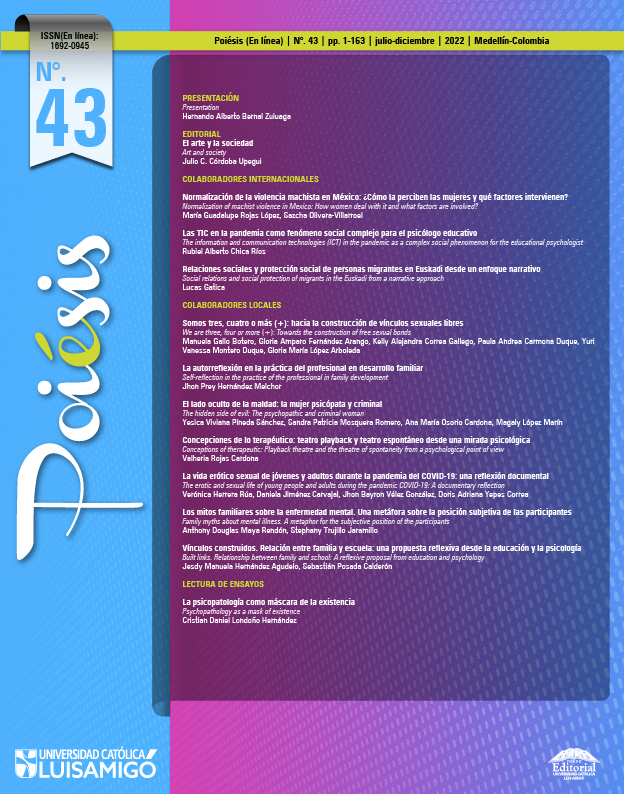The Family myths about mental illness. A metaphor for the subjective position of the participants
DOI:
https://doi.org/10.21501/16920945.4385Keywords:
Analytical psychology, Family, Family myths, Mental Illness, Mirror, Myth, PsychoanalysisAbstract
Abstract:
The present essay, is the result of the investigation Family Myths about Mental Illness, carried out within the framework of the course Degree Work II to opt for the degree of Psychologists. The question that guided our research is: What are the myths about mental illness in two generations of a family in which one of its members has mental illness? We relied on Psychoanalysis and Analytical Psychology for the interpretation of the results. The research was carried out with a qualitative methodological design and a descriptive phenomenological approach through a case study. The Kinetic Drawing of the family in the present and the Kinetic Drawing of the family in the past, as well as the conversational narrative with a semi-structured interview were used as instruments for the collection of information. The research participants are two adult women, mother and daughter, where the latter was diagnosed with mental illness at some point in her life. From the research process it is concluded that the family myth about mental illness is weakness "something that only happens to people with weak character", however, this myth has been transformed, because mental illness in the family is currently seen as a means for the acquisition and endowment of qualities, as something that strengthens the soul.
Downloads
References
Balcázar Nava, P., González Arratia López-Fuentes, N. I., Gurrola Peña, G. M., & Moysén Chimal, A. (2006). Investigación cualitativa. Universidad Autónoma del Estado de México.
Bettelheim, B. (1994a). La lucha por el significado. En S. A. Grijalbo Mondadori (comp.), Psicoanálisis de los cuentos de hadas (pp. 6-24). Crítica.
Bettelheim, B. (1994b). La reina celosa en “Blancanieves” y el mito de Edipo. En S. A. Grijalbo Mondadori (comp.), Psicoanálisis de los cuentos de hadas (pp. 229-252). Crítica.
Campbell, J. (1988). El mito y el mundo moderno. En C. Aira (trad.), El poder del mito (pp. 16-60). Emecé Editores.
Congreso de la República de Colombia. (2006, 6 de septiembre). Ley 1090 de 2006. Por la cual se reglamenta el ejercicio de la profesión de Psicología, se dicta el Código Deontológico y Bioético y otras disposiciones. Diario Oficial n. ° 43.383. https://www.funcionpublica.gov.co/eva/gestornormativo/norma.php?i=66205
Furth, G. M. (2005). Elementos esenciales para la comprensión de los dibujos. Mecanismos auxiliares de terapia y diagnóstico. En T. Gottlieb (trad.), El secreto mundo de los dibujos: sanar a través del Arte (pp. 60-160). Ediciones Luciérnaga.
García Ramos, P., Moreno, A., Freund, N. & Lahera, G (2012). Factores asociados a la emoción expresada familiar en la esquizofrenia: implicaciones terapéuticas. Revista de la Asociación Española de Neuropsiquiatría, 32(116), 739-756.
Díaz-Bravo, L., Torruco-García, U., Martínez-Hernández, M., & Varela-Ruiz, M. (2013). La entrevista, recurso flexible y dinámico, Investigación en Educación Médica, 2(7), pp.162-167.
Osornio, B. (2013). La gran madre en los matriarcados: un análisis del arquetipo materno según la teoría Jungiana [tesis de pregrado, Universidad Nacional Autónoma de México]. Repositorio Institucional Universidad Nacional Autónoma de México. http://132.248.9.195/ptd2013/abril/0691361/0691361.pdf
Sandoval Casilimas, C. A. (1996). Investigación cualitativa. ARFO Editores.
Reyes Contreras, G. (2016). Exploración teórico-empírica de la construcción del concepto de psique arquetipal femenina, desde la mirada psicodramática y junguiana [tesis de doctorado, Universidad de Salamanca]. Repositorio Institucional Universidad de Salamanca. https://gredos.usal.es/bitstream/handle/10366/137138/DPBPMCC_ReyesContrerasG_ExploracionTeorico.pdf?sequence=1
Rodríguez Gómez, G., Gil Flores, J., & García Jiménez, E. (1996). Métodos de la investigación cualitativa. Ediciones Aljibe.
Garzón De Laverde, D. I. & Riveros Reina, M. C. (2012). Procesos narrativos conversacionales en la construcción de la identidad del joven y la familia con problemas de consumo de SPA en una institución de rehabilitación. Psicogente, 15(28),385-413. ISSN: 0124-0137. https://www.redalyc.org/articulo.oa?id=497552361014
Published
How to Cite
Issue
Section
License

This work is licensed under a Creative Commons Attribution-NonCommercial-NoDerivatives 4.0 International License.
La revista y los textos individuales que en esta se divulgan están protegidos por las leyes de copyright y por los términos y condiciones de la Licencia Creative Commons Atribución-No Comercial- 4.0 Internacional. Permisos que vayan más allá de lo cubierto por esta licencia pueden encontrarse en http://www.funlam.edu.co/modules/fondoeditorial/ Derechos de autor.











